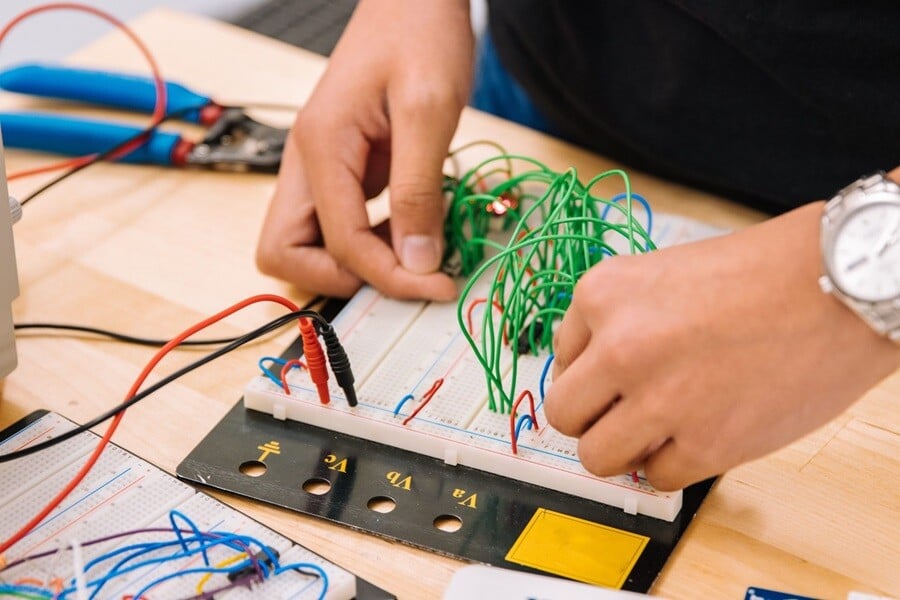
Mumbai has been known as the city of dreams for decades, but little do we know that it is also amongst the famous choice of students when it comes to technical education, especially in electrical Engineering. Mumbai offers an abundance of electrical courses intended to meet the specifications of the present-day marketplace for aspiring engineers.
These courses, ranging from diploma degrees to advanced certifications, give students knowledge in areas which include automation, power systems, and renewable energy.
In this blog, we will discuss in-depth the top electrical courses in Mumbai, their fee structure, course duration, and future career prospects.

What are the Best Electrical Engineering Courses in Mumbai?
To help you save time, we have made a list of the most popular electrical Engineering Courses in Mumbai in the following table, along with the details about the fees, duration of the study, eligibility, and certification.
|
List of Course |
Fees |
Duration |
Eligibility |
Certificate Obtained (Yes/No) |
|
Electrical Design Course by Novatr |
₹1,95,000 |
7 Months |
Engineering students/ professionals |
Yes |
|
Distribution Power Engineering Fundamentals by Udemy |
N/A |
6 Hours |
Engineering students/ professionals |
Yes |
|
Fundamentals of Electrical Controls by Udemy |
N/A |
3 Hrs. 53 Min. |
Engineering students/ professionals |
Yes |
|
Fundamentals of Electrical Systems and Electrical Architecture by Skill-Lync |
₹ 40,000 |
1 Month |
Engineering students/ professionals |
Yes |
|
Electric Circuit Analysis: Electronics, Electrical Engineering by Udemy |
N/A |
4 Hrs. 45 Min |
Engineering students/ professionals |
Yes |
Top Electrical Engineering Institutes in Mumbai
Mumbai is home to numerous prestigious institutions offering electrical engineering courses, catering to students and professionals seeking quality education and career advancement. These institutes provide a mix of theoretical knowledge, hands-on training, and excellent placement opportunities. Here's a look at some of the top colleges offering electrical engineering courses in Mumbai, including options for part-time electrical diploma courses and short-term electrical courses.
1. Novatr
Novatr is ideal for those looking for part-time electrical courses in Mumbai or those looking for flexible, unconventional learning options. Its self-paced online learning model suits working professionals and students managing other commitments. Novatr is an excellent choice for short-term certifications or Mumbai electrical design courses focusing on modern industry requirements.
|
Details |
Information |
|
Course Offered |
Short-Term and Part-Time Electrical Design Courses |
|
Fees |
₹499 – ₹1,95,000 |
|
Duration |
3 to 6 months |
|
Eligibility |
Open to working professionals and students with basic knowledge of electrical engineering |
|
Highlights |
Flexible online learning, ideal for professionals, focused on electrical design and related skills. |
2. Indian Institute of Technology (IIT) Bombay
IIT Bombay is renowned globally for its cutting-edge research and high-quality education. Offering a range of electrical engineering courses in Mumbai, this prestigious institution provides advanced laboratories, corporate collaborations, and a stellar faculty. Whether you’re pursuing a degree or a diploma in electrical engineering, IIT Bombay equips students with the skills needed to excel in industries like power systems, automation, and renewable energy.
|
Details |
Information |
|
Course Offered |
B.Tech and M.Tech in Electrical Engineering |
|
Fees |
₹2,20,000 – ₹2,50,000 per year |
|
Duration |
4 years (B.Tech), 2 years (M.Tech) |
|
Eligibility |
B.Tech: JEE Advanced; M.Tech: GATE |
|
Highlights |
Advanced labs, world-class faculty, and strong corporate partnerships. |
Read More: Top MEP courses in Kochi
3. Vidyavihar Institute of Technology and Science (VIT)
VIT is popular for those interested in part-time electrical diploma courses in Mumbai or affordable, job-oriented programmes. Known for its practical training approach, the institute offers various electrical diploma courses in Mumbai, helping students gain industry-relevant skills. Its cost-effective education model ensures that high-quality learning is accessible to a broader audience.
|
Details |
Information |
|
Course Offered |
Diploma and B.Tech in Electrical Engineering |
|
Fees |
₹1,50,000 – ₹1,80,000 per year |
|
Duration |
3 years (Diploma), 4 years (B.Tech) |
|
Eligibility |
Diploma: 10th-grade pass with 50%; B.Tech: 12th-grade PCM + valid entrance score |
|
Highlights |
Practical training, affordable education, and job-oriented skills. |
4. Fr. Conceicao Rodrigues College of Engineering (CRCE)
CRCE stands out for its strong focus on practical training and industry readiness. The college offers short-term electrical courses in Mumbai alongside its full-time programmes, catering to students who want to enhance their skills quickly. With innovative labs, internships, and industry collaborations, CRCE ensures students are well-prepared to tackle real-world engineering challenges.
|
Details |
Information |
|
Course Offered |
B.E. in Electrical Engineering |
|
Fees |
₹1,30,000 – ₹1,60,000 per year |
|
Duration |
4 years |
|
Eligibility |
12th-grade PCM + MHT-CET or JEE Main score |
|
Highlights |
State-of-the-art labs, industry internships, and collaborative projects with major organisations. |
5. K. J. Somaiya College of Engineering
Known for its modern infrastructure and research-driven syllabus, K. J. Somaiya College of Engineering is among Mumbai's top choices for electrical engineering courses. The college offers courses tailored to market demands, including electrical design courses in Mumbai focusing on automation and renewable energy. Its strong placement cell ensures graduates secure jobs with leading companies in India and beyond.
|
Details |
Information |
|
Course Offered |
B.Tech in Electrical Engineering |
|
Fees |
₹1,70,000 – ₹2,00,000 per year |
|
Duration |
4 years |
|
Eligibility |
12th-grade PCM + MHT-CET or JEE Main score |
|
Highlights |
Renowned for innovation, research, and industry connections. |
Why Choose Mumbai for Electrical Engineering Courses?
Mumbai offers various programmes, from short-term electrical courses to part-time electrical diploma courses, enabling students to pick options that suit their career goals and schedules. With access to world-class infrastructure, experienced faculty, and placement opportunities in top companies, studying in Mumbai ensures a promising future in the electrical engineering field.
Get Job-Ready with Novatr’s Electrical Engineering Course Syllabus
This platform offers one of the standout courses amongst online education businesses. The courses here are designed specifically to fill the gap between traditional theoretical knowledge and the hands-on experience required in today’s ever-changing marketplace.
Following is the detailed course syllabus that Novatr offers for Electrical Courses:
|
Course Type |
Course Name |
|
Foundation Courses |
Introduction to BIM |
|
Fundamentals of Mechanical & Plumbing |
|
|
Fundamentals of Electrical |
|
|
Core Courses |
Documentation and Presentation in BIM |
|
Information Management |
|
|
Spatial programming Schedules & Audits |
|
|
Information Modeling 101 |
|
|
Collaborative Courses |
Industry Standards, BEP & Digital Scoping |
|
Collaboration and Coordination |
|
|
Clash Detection and Construction |
|
|
Capstone Project |
What Are the Career Opportunities in Electrical Engineering After Novatr?
Completing Novatr's Mechanical Electrical and Plumbing (MEP) course in electrical engineering opens doors to a number of rewarding career possibilities.
This course will prepare professionals with deep technical knowledge and practical skills in electrical systems modelling, analysis, and design. It provides an in-depth review of the job opportunities and professional paths readily available to Novatr alumni.
Below are some of the job options:
1. Power Systems Engineer
Average Salary: INR 4 LPA - 7 LPA
Duration: Varies (Typically 2-4 years to become proficient)
Power Systems Engineers design, operate, and manage electrical power networks transporting electricity from power stations to consumers. As the world transitions towards renewable energy, Power Systems Engineers also integrate solar, wind, and other renewable sources into the grid. The course provides a strong foundation in power system modelling, analysis, and design, preparing you for these impactful roles.
2. Control Systems Engineer

Average Salary: INR 7 LPA
Duration: Varies (Typically 3-5 years of experience)
Control Systems Engineers specialise in designing and implementing control systems that ensure machinery and equipment perform optimally. They work in the automotive, aerospace, and manufacturing industries, focusing on systems that manage production lines or flight control systems. The course prepares you with the skills to programme and design control systems that meet strict tolerances and productivity requirements.
3. Telecommunications Engineer
Average Salary: INR 6 LPA
Duration: Varies (Usually 3-5 years to gain expertise)
Telecommunications Engineers design and implement communication systems, including satellite communication, fibre optic networks, and 5G. They focus on ensuring the security and reliability of communication channels while enhancing signal strength. This course equips professionals with the technical expertise to manage and upgrade modern telecommunication infrastructures, a key growth area in today's tech-driven world.
4. Electronics Design Engineer
Average Salary: INR 5 LPA
Duration: Varies (Typically 2-5 years to become proficient)
Electronics Design Engineers are responsible for designing and improving electronic systems used in everyday products and specialised machinery. This role involves creating prototypes, testing new designs, and ensuring adherence to safety standards. The Novatr course prepares professionals with the practical and theoretical knowledge to innovate and lead in electronics design.
Also Read: MEP Courses in Bangalore
5. Electrical Project Manager
Average Salary: INR 5 LPA
Duration: Varies (Typically 5+ years of experience in project management)
Electrical Project Managers oversee the execution of electrical projects across various sectors, such as commercial, infrastructure, and construction. They manage budgets, timelines, and teams to ensure that projects meet quality and safety standards. The course prepares you to take on leadership roles in managing electrical projects, providing you with skills in planning, execution, and team management.
In Conclusion
When selecting the best electrical courses in Mumbai, it’s essential to simplify your decision-making process. Start by identifying the key features you want in an electrical programme: flexibility, industry relevance, or career support. Compare your options using a pros and cons list to evaluate which courses best match your career goals and offer the most significant potential for professional growth.
For those looking to advance their career in electrical engineering, Novatr offers specialised programmes, including part-time electrical diploma courses and short-term electrical courses in Mumbai. The BIM Professional Program for MEP Engineers by Novatr is a standout choice.
It equip students with essential knowledge and practical skills in electrical systems, design, and modelling. Additionally, the platform provides valuable placement assistance, ensuring graduates are well-prepared for key positions in the electrical industry.
To explore Mumbai's electrical engineering courses and opportunities, visit our Resources Page.
Frequently Asked Questions
1. What are the best electrical engineering courses in Mumbai?
A: Look for courses that cover fundamentals like circuit analysis, electromagnetism, and power systems. Specialisations in power electronics, control systems, and renewable energy can enhance your career prospects.
2. Which colleges offer top electrical engineering programmes in Mumbai?
A: Some top colleges include IIT Bombay, VJTI, and DY Patil College of Engineering.
3. What are the job prospects for electrical engineers in India?
A: Electrical engineers are in high demand across various sectors, including power generation, transmission, distribution, and manufacturing.
4. What are some emerging trends in electrical engineering?
A: Some emerging trends include renewable energy technologies, electric vehicles, smart grids, and artificial intelligence applications.
5. How can I prepare for an electrical engineering career?
A: Focus on strong fundamentals, gain practical experience through internships or projects, and stay updated with technological advancements.
6. What are the challenges faced by electrical engineers?
A: Electrical engineers often face challenges like complex design problems, safety regulations, and rapid technological change.
Was this content helpful to you



.jpeg)



